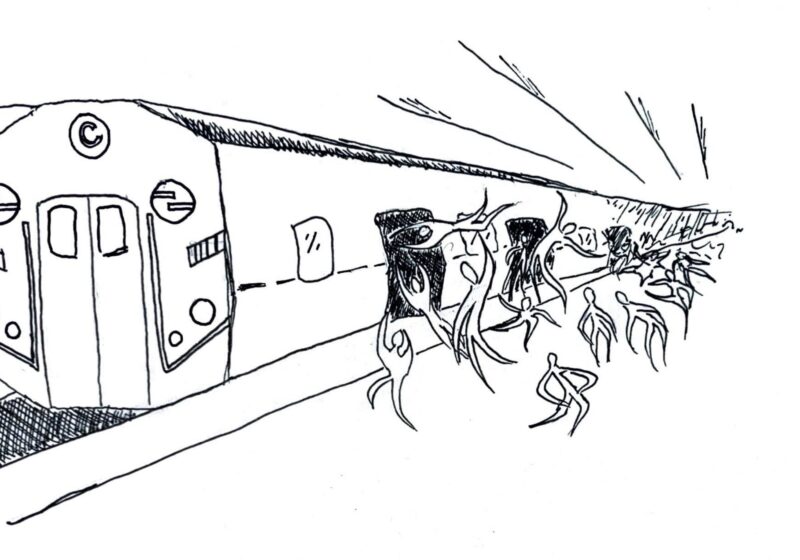I am, to put it succinctly, most ardently in love with TOOP’s rendition of Pride and Prejudice.
To ramble and pontificate on the subject, in a way most unbecoming and forthright, this showing of Pride and Prejudice was not only one of my favorite shows I’ve ever seen on campus, but one of my favorite theatrical productions I have ever had the pleasure of viewing. This is not an exaggeration. I’m unsure of whether it was the audience’s propensity for audibly and visibly reacting to the Regency-era quips — to which I contributed an extensive amount — or the combined immersion of sitting in the front row and the actors traversing through the aisles during scenes and transitions alike that contributed to my affinity for the piece, but nonetheless, I was absolutely enthralled by the goings-on of the show.
Okay, I promise, I’m done attempting to sound pretentious — at least, vernacular-wise. This show slapped. Obviously, P&P is a tried-and-true, fan-favorite romcom, but this staging brought a vivacity and life to the text that made even those who had no background on the story engaged. My friend who came with me to the show knew nothing about the plot, but she snickered, howled, and hollered alongside me all the same.
This can easily be attributed to the actors, all of whom shared a chemistry that I have to assume is rare to find amongst such a big cast. Characters who show up for only a scene or two don’t fade into the woodwork — instead, they serve as the epitome of a supporting cast. For example: sophomore Allison Hong’s Mary Bennet, the least notable of all of the Bennet sisters in terms of character prominence, has a sweet little soliloquy at the beginning of the show that portrays her as condescending in a humorous way, which is a great juxtaposition to the sweet and gentle Jane (played by sophomore Madeline Murray), fanciful and sprightly Kitty (played by first-year Emily Adler) and even more boy-crazy Lydia (played by senior Jules Pereira). The entire Bennet family’s dynamic is to die for — there’s no way you could be nearly as invested in what happens to protagonist Elizabeth without being attached to her family almost as much as she is, and the actors do a great job of conveying this love and frustration with each other, through their similarities and differences. Major props to Pereira, who carries a lot of the comedy in the first act with her nearly sickly-sweet timbre.
This isn’t to say that the Bennet family are breaking their backs by carrying the show. In fact, there was not a single weak link amongst the cast. In particular, the conflict-driven side characters — first-year Bug Cartwright as Mr. Collins, junior Dominique Neveu as George Wickham, and first-year Ember Johnson as Lady Catherine De Bourgh — all played their roles to perfection, and every group scene had lots of little moments to enjoy and pick out no matter where you looked. A particular favorite of mine was during a ball scene where Cartwright and junior Meghan Clark (playing Charlotte Lucas) failed miserably at dancing together in the background. It’s hard to compliment anyone without wanting to compliment everyone ad nauseam, so I will leave this section at this: I was fully enamored with every single side character in a way I never have been in a show. Every character felt like a person, fleshed out and lived in.
Sophomores Molly Goonan and Lilli Tamm (the latter being one of Campus Times‘ beloved Humor Editors) did a wonderful job as protagonists Elizabeth Bennet and Mr. Darcy respectively, and their love story was portrayed with the perfect amount of visibly-occurring subtext and gentleness to make a poor writer (me) swoon audibly multiple times throughout the show. Goonan’s headstrong portrayal of Lizzie makes her easy to relate to and root for as she attempts to get to the bottom of Darcy’s true persona, and Tamm’s standoffish and glaring Darcy melts into the perfect heartfelt gentleman as Act Two comes to a head. It’s easy to see why Darcy is adored by fans of the original publication (and every subsequent iteration of the work). The casting of Tamm, who is not a man, as Darcy is mentioned by junior and director of Pride and Prejudice Mila Bologna as necessary to portraying the character’s nuances. “There is something both distinctly feminine and distinctly queer about the romance in this show, as well,” Bologna says in the playbill’s director’s note. “While I did not want to change the ‘canonical’ genders of the characters, it became clear to me as I studied the script that a man would simply have a harder time understanding the place Mr. Darcy takes up in the show. He is, as I have said many times, ‘just such a lesbian’. I hope you understand what I mean.” Tamm shows that this decision was not only understandable, but well-made.
Bologna should be lauded for their approach to putting the show together — given that TOOP’s productions are all free to attend, I wasn’t expecting the quality of any of the parts of the show to be as rich as they felt. The set, while sparse, was furnished just enough to add to the Regency air, and the lighting and music cues aided in the blocking perfectly. The best scenes staging-wise were the ball scenes, but even when characters were just standing and talking, nothing felt stagnant. The lack of extensive dressing and sound effects added to some humorous moments, such as Mr. Gardiner’s (junior Evan Changar) admiration of one of Darcy’s streams on his property, which consisted of Changar crouching and picking at the empty floor. I fully cackled.
Given that I went to the final show, those who attended prior showings would not have gotten to see the most show-stopping, riot-inducing part of the performance to me, which was Cartwright emerging from underneath the stage to deliver lines during a scene in Act Two — I cannot begin to explain the uproar of hilarity that arose in the crowd — but, really, that moment is only one of many that show Bologna’s completely validated trust in their cast and crew. I cannot wait to see what TOOP comes up with next.





